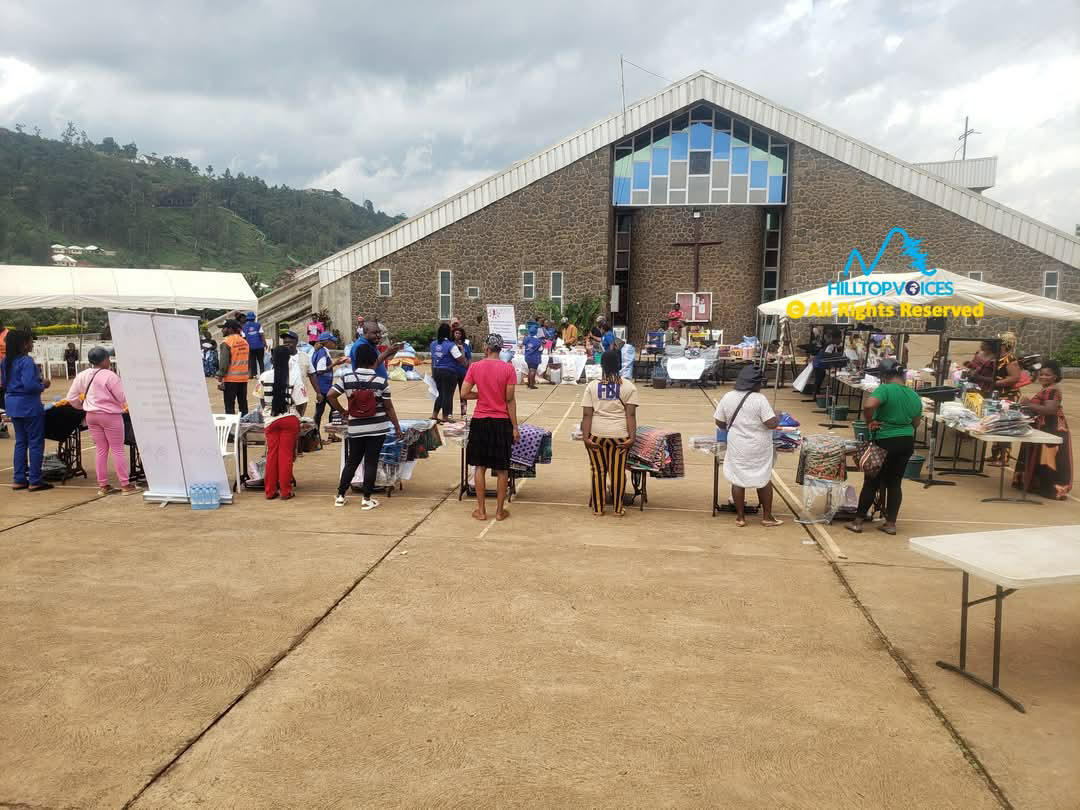In a community marked by the long, silent cries of loss and survival, one woman's smile became the unexpected highlight of a humanitarian event in Ntamulung Bamenda. On Thursday 15 May 2025, the Centre for Advocacy in Gender Equality and Action for Development (CAGEAD) handed over income-generating items to 35 vulnerable community members as part of its “building community resilience and improving livelihoods with Ntamulung and Santa Communities” project, supported by the International Organization for Migration (IOM). But it was not the size of the items or the quantity that stirred emotion; it was the quiet rebirth of hope seen in the smile of Afuh Judith, fondly called Mama G and other beneficiaries.
View of beneficiaries as they received their items
For the first time in more than eight years, Mama G’s face carried a visible expression of joy; an emotion that had long been eclipsed by loss, displacement, and survival. Sitting besides the income generating items she had just received, her eyes sparkled with a mix of gratitude and disbelief.
“Only God could have planned this.” she said, her voice trembling with emotion.
Originally from Batibo Central town in Momo Division, an area ravaged by the armed conflict in the North West Region, Mama G had once made a living selling cooked food to support her family. When the fighting intensified, she fled to Bamenda, seeking refuge in Ntamulung with her family. The journey since then has been one of pain. Four years ago, she lost her husband in the midst of displacement. Later, she also lost her 29-year-old son then a sibling shortly after. Left with nine dependents and battling illness for over eight months now, life had grown heavy and bleak.
Mami G with her items
“I did not know how we were going to survive... But the day the CAGEAD team came to my house (for a needs assessment), they told me everyone had waited for me. That’s when I knew God had remembered me.” she recalled
Through CAGEAD’s intervention, Mama G was trained and empowered. Today, she walks away with items that promise a fresh start with her food cooking and selling business. Her group is part of several income generating sectors supported by the project, including poultry, mobile money services, tailoring, hairdressing, barbing, restaurant services, pastry-making, and table market businesses.
She is not alone.
Ambe Gerald Che, a young man from Agyati Bafut, stood beside his newly manufactured cooking pots, items he says symbolise a second chance at life.
“Our home in the village was burnt. I lost everything and now take care of four of my younger brothers... With these, I can start again.” he explained
From Oku in Bui Division, Jaff Lizette, a hairdresser, expressed similar gratitude.
“It has not been easy since my father died during the conflict. But with this support, I can finally earn something to take care of the family.” she said
From Awing, Pemiah Phanuel, another recipient, was visibly moved.
“I never expected all of this” she said, showing off her new embroidery machine, velvet material amongst others
“Now, I can work from home and support the children.” she added
Each testimony echoed the same narrative, displacement, loss, and finally, a glimmer of hope through empowerment.
According to Ndifor Kishana, Project Coordinator at CAGEAD, the distribution of items is more than just a gesture of kindness; it is a calculated step toward sustainable livelihoods.
“These are income-generating activities. They are not handouts but investments... We have trained beneficiaries on bookkeeping, income management, and business principles. Monitoring teams will carry out follow-ups to ensure that this support translates into real change.” she explained
Speaking to Hilltopvoices, Andiensa Clotilda Waah, CEO of CAGEAD, emphasised the inclusive nature of the project.
“When displaced persons integrate into host communities, the burden does not remain theirs alone, it becomes a shared reality. That is why our approach targets both displaced individuals and host populations,” she said.
She further noted that over 65% of beneficiaries from last year’s batch had successfully grown their ventures.
“They are running restaurants, expanding businesses, and some have even bought new equipment. The community focal points are doing a fantastic job with follow-up.” she assured
And while women formed the majority of the recipients, Andiensa Clotilda clarified that this was not by design but rather a result of the community selection criteria.
“Women often meet the vulnerability benchmarks and are more available. We simply respond to the realities we find.” the CEO concluded
One of those realities was personified by Idam Celine, a 2024 beneficiary based in Bamenda. Taking the microphone, she shared her story of transformation.
“From a table market vendor, I now run my own store... Discipline and saving daily helped me get here. Please, do not disappoint the donors.” she said beaming with smiles
For many in attendance, the event offered more than just material assistance. It was a moment of validation; a recognition of their struggle and a call to rebuild.
But it was Mama G’s smile, rare and radiant, that will remain etched in the memories of those present. In that single expression lay a thousand untold stories. Of fear turned into faith. Of pain channelled into purpose. And of a woman who, after eight long years, found something worth smiling for again.
By Bakah Derick
Email: hilltopvoicesnewspaper@gmail.com
Tel: 6 94 71 85 77



